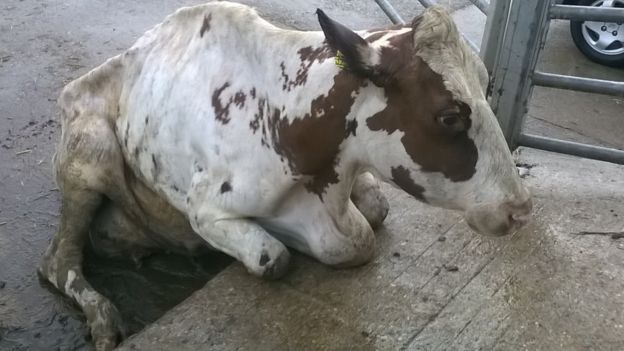
A farmer has been ordered to pay out nearly £3000 after "kicking" and "vigorously pushing" a cow for half an hour to get it to move.
44-year-old Graham Anstey, from Somerset, has been prosecuted for causing unnecessary suffering to a cow left on the ramp of a Dorset slaughterhouse. He also breached TB disease control restrictions by illegally moving livestock.
On Friday (27 April) at Poole Magistrates’ Court, Mr Anstey pleaded guilty to the offences. He was fined a total of £850 and ordered to pay £2000 towards the prosecution costs.
The court heard that in April 2016 Mr Anstey transported a group of 17 cattle to a slaughterhouse in Dorset.
He arrived at a slaughterhouse in Bridport at approximately 4am, when it was closed. He began offloading the animals into a pen, but one cow collapsed in the back of his vehicle.
Mr Anstey was then seen on recovered CCTV footage "kicking, vigorously pushing and violently pulling the tail" of this cow to get it to move.
This persisted for half an hour, but the cow could only walk as far as the delivery ramp before it collapsed again.
He then drove off and left the animal, until it was discovered by the slaughterhouse staff when they arrived for work at 6am.
The cow was then humanely euthanased with the authority of a vet and the incident was investigated by officers from Dorset County Council’s Trading Standards Service.
TB disease control
Enquiries revealed that Mr Anstey had purchased the animals from a market in Shropshire a few days earlier.
This particular market was permitted to sell cattle without having to test them for TB (tuberculosis) first, as is usual, because all the livestock are intended to go straight to slaughter or other approved livestock units and so reduces the risk of spreading the disease.
Instead, Mr Anstey arranged for the cattle to be transported from the market to his farm in Somerset, before taking them a few days later to the Dorset slaughterhouse. By doing this he risked introducing TB to his own cattle but also those of surrounding farms.
In his mitigation the court was told that there was no intent or recklessness in not reporting the livestock moves.
He said he accepted what he did was wrong and that he was ashamed about the situation and the effect it was having on him and his family, stating that this was a limited and isolated incident.
Neil Martin, principal trading standards officer at Dorset County Council said in their experience, Dorset farmers take their responsibilities "seriously".
However, referring to Mr Antsey, he said: “Causing unnecessary suffering to livestock is unacceptable and incidents like this would always lead to investigation by animal health officers in the trading standards service.”
